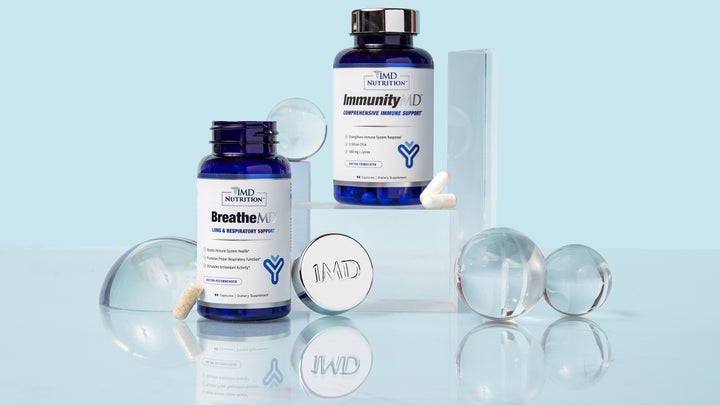The immune system is a network of lymphatic channels, cells, proteins, and antibodies that work to protect against environmental threats. The complexity of the immune system is influenced by an ideal balance of many factors, of which a nutrient-rich diet is essential.
There is no one ‘magic’ nutrient, but there are 5 essential nutrients you want to have around for optimal immune health.
1. Probiotics
Seventy percent of your immune system lives in your gut, which means the bacterial community in your gut does more than just digest food. These microbes are essential to overall health and immunity. Probiotics help nourish the body’s natural defenses by maintaining a healthy bacterial balance to help your body take on environmental threats.
Certain probiotic strains within the Lactobacillus family provide targeted benefits for immune health. L. rhamnosus helps promote the production of immune cells, specifically T-lymphocytes, which help promote a strong immune response, while L. acidophilus helps promote the body’s natural healing rate. For optimal immune system support, aim to consume between 10 and 20 billion CFUs per day.
You can get probiotics through diet by eating foods like yogurt and fermented foods such as kimchi, miso, and sauerkraut. You can also take a daily supplement like ImmunityMD®, with potent dosages of both L. rhamnosus and L. acidophilus, supported by zinc and L-lysine, to promote healthy immune responses and reduce everyday worry and anxiety.
2. Vitamin C
Vitamin C is an essential nutrient that is mostly found in your white blood cells. By reducing occasional oxidative stress and supporting immune cell production and activity, vitamin C helps protect you from environmental threats. It also helps strengthen epithelial tissue, which lines your digestive and respiratory tracts and is the first main defense of our immune system.
Your body cannot produce vitamin C, so you must get it from your diet. The daily recommended intake for vitamin C is 90 milligrams for adult men and 75 milligrams for adult women. You can add vitamin C to your diet with citrus fruits, berries, tomatoes, potatoes, broccoli, spinach, Brussels sprouts, and cabbage. You can also add a supplement to your daily routine to help maintain healthy levels.
With 1MD Nutrition’s BreatheMD™, you get the combined benefits of vitamin C and other immune-supporting nutrients like vitamins D3 and E. Vitamins C and D3 both work to support healthy lung tissue, while vitamin C also helps the body to recycle spent vitamin E, another vitamin that supports immune cell production.

3. Zinc
Zinc is the second most abundant trace mineral in the body after iron. It is an essential element that your body uses in countless ways and can be found in every cell. Zinc supports DNA synthesis, enzyme activity, and immune function. By supporting immune cell activity, zinc can promote healthy immune responses to protect against everyday toxins.
As a trace mineral, your body does not need much zinc. However, your body doesn't store zinc, so you need to consume enough each day to meet the daily requirements of 11 milligrams per day for men and 8 milligrams per day for women.
You can get zinc from several food sources such as whole grains, meat, beans, nuts, and dairy. You can also take zinc supplements to help maintain healthy levels.
If you are looking to support immune health, supplements containing potent dosages of zinc can help. 1MD Nutrition’s immune health supplements contain zinc along with additional immune-supporting nutrients. Get comprehensive immune support with ImmunityMD®, or promote the immune response system, particularly as it relates to lung health with BreatheMD™.
4. Vitamin D3
Vitamin D3 (cholecalciferol) is a form of vitamin D produced by the skin when exposed to sunlight. This essential vitamin helps support bone, muscle, and heart function. It also activates key peptides responsible for healthy lung tissue and promotes the function of immune cells, including T-cells and macrophages, that protect your body against invaders.
The daily recommended intake for vitamin D3 is 600 IU (international units) for adults up to age 70 and 800 IU for adults over 70. You can get vitamin D3 through diet by eating fatty fish like trout, salmon, and tuna, as well as egg yolks, cheese, and mushrooms.
You can also get vitamin D3 and additional immune-supporting nutrients in BreatheMD™. As part of a healthy routine, 1MD Nutrition’s immune supplement can help you maintain proper levels of vitamin D3 in the body to support lung health and reduce occasional damage to the cellular lining of the respiratory tract.

5. Vitamin E
Vitamin E is a fat-soluble nutrient found in many foods that helps reduce occasional oxidative stress, which supports the health of several systems in the body. One of the key benefits of vitamin E is its ability to support T-cell production, a broad class of immune cells responsible for identifying and taking out problem cells. When the body’s T-cell populations are healthy, our immune response flourishes.
As we age, our ability to retain vitamin E diminishes along with our ability to nourish the immune system, so it is important to maintain healthy levels through diet or supplementation. The recommended daily vitamin E intake for adults is 15 milligrams, and you can find it in foods like almonds, collard greens, spinach, pumpkin, asparagus, avocado, and mango.
Vitamin C helps the body recycle spent vitamin E, which makes the pairing of vitamins C and E in BreatheMD™ an effective way to support immune health. Additionally, the vitamin E in this formula works alongside African geranium to promote the body’s natural healing rate and l-cysteine to help maintain normal mucus thickness for lung and respiratory health.
Final Thoughts
Nutrition is one of the most important factors in promoting immune and overall health, along with regular exercise and everyday stress management. The best way to meet the nutritional needs of your immune system is with a balanced diet that includes these five essential nutrients. And, when you need a little something extra, 1MD Nutrition’s immune-supporting supplements have you covered.
Dr. Brian Greenberg

Dr. Brian Greenberg is an immunologist, allergist, and pediatrician who received his medical degree from the University of Florida, and completed his residency and fellowship at UCLA. He has practiced medicine in Southern California for almost 25 years.






